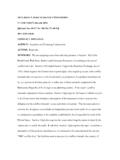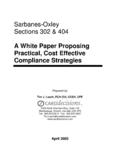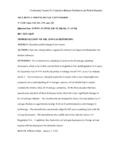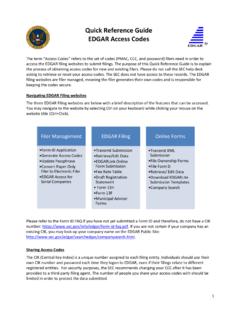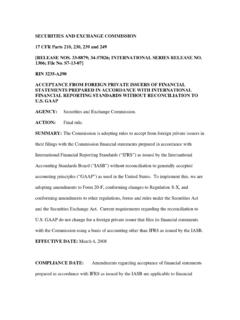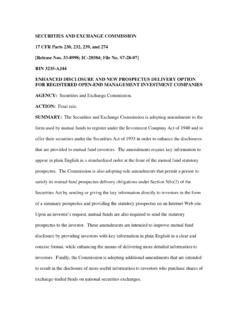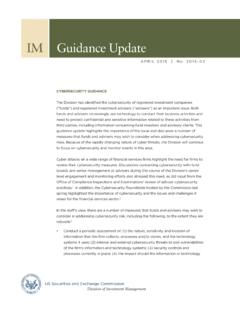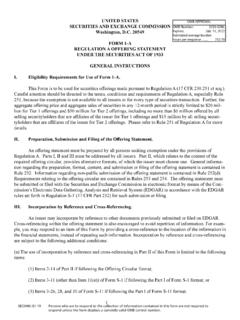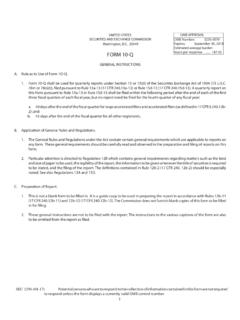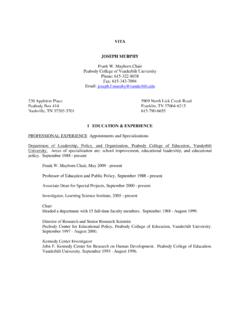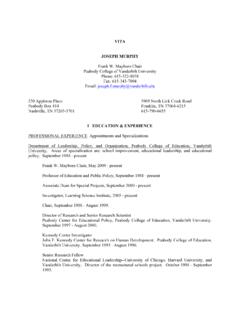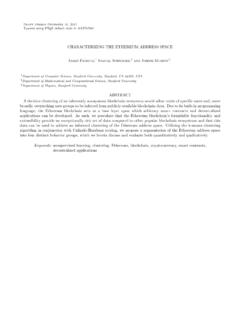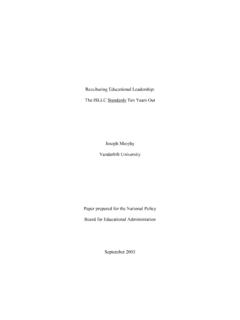Transcription of Joseph Murphy, Esq. Donna Boehme, Esq. Rebecca …
1 Joseph murphy , Esq. Donna boehme , Esq. Rebecca Walker, Esq. December 17, 2010 Ms. Elizabeth M. murphy Secretary Securities and Exchange Commission 100 F Street, NE Washington, DC 20549-1090 Re: File Number S7-33-10 The Securities Whistleblower Incentives and Protection Program of the Dodd-Frank Wall Street Reform and Consumer Protection Act Dear Ms. murphy : We write as compliance and ethics professionals who have worked with companies, government agencies, and non-governmental organizations in the field of compliance and ethics. We have attached brief bios giving our background in this field. This letter is in response to the request by the Securities and Exchange Commission (the "Commission") for comments about proposed rules promulgated by the Commission in response to Section 922 of the Dodd-Frank Wall Street Reform and Consumer Protection Act (the "Dodd-Frank Act"), or the Securities Whistleblower Incentives and Protection Program.
2 Overview The Dodd-Frank Act established a whistleblower program that requires the Commission to pay awards to eligible whistleblowers who voluntarily provide the Commission with original information about a violation of the federal securities laws that leads to the successful enforcement of a covered judicial or administrative action, or a related action. The Act also requires the Commission to promulgate regulations governing such awards. In particular, the Dodd-Frank Act directs the Commission to pay awards equal to 10% to 30% of the amount of monetary sanctions collected resulting from original information relating to a violation of the securities laws if the monetary sanctions exceed $1 million. The actual amount of the award within those parameters is determined at the discretion of the Commission.
3 Comment Letter from Joseph murphy , Donna boehme and Rebecca Walker File Number S7-33-10 December 17, 2010 Page 2 Compliance Programs and the Controversy Surrounding this Provision of the Act Encouraging employees and others to report suspected misconduct is a critical element of any compliance and ethics program, and a critical means of prevention and early detection of misconduct. As the Commission is undoubtedly aware, this provision of the Dodd-Frank Act has generated a significant amount of controversy regarding, in particular, whether the incentives offered by the Dodd-Frank Act will cause employees to bypass internal reporting procedures and thereby impair companies reporting systems and compliance and ethics programs more broadly. We do not offer an opinion on that claim.
4 Instead, we write to suggest that, regardless of the merits of that claim, the Commission s responsibility to promulgate regulations in this instance provides it with an important opportunity to address the Commission s support of compliance and ethics programs in the context of enforcement actions. Indeed, a pronouncement by the Commission regarding its willingness to consider compliance and ethics programs in the context of enforcement decisions should go a considerable way toward alleviating concerns regarding the impact of the Dodd-Frank Act on internal reporting mechanisms and compliance and ethics programs more broadly. We respectfully suggest that the Commission consider making a pronouncement which could be contained in its release adopting rules relating to Section 21 F that the Commission will consider the existence of an effective compliance and ethics program when determining whether to bring an enforcement action against an organization, the types of charges it might bring, and the nature and amount of remedial relief that will be pursued.
5 We believe that the Commission s promulgation of rules governing whistleblower incentives creates an important opportunity to enhance compliance with the nation s securities laws in a way that will more securely protect the interests of the investing public that is, through enhanced support of compliance and ethics programs. The Commission s Prior Statements Such a pronouncement by the Commission would be consistent with (but, we hope, would expand upon) the Commission s articulated support for compliance and ethics programs in the past. As far back as 2001, in the Seaboard Release, the Commission articulated a framework for evaluating whether and how to charge violations of the federal securities laws that echoed the support of compliance programs found in the United States Sentencing Guidelines.
6 There, the Commission expressly stated that its willingness to credit self-policing and self-reporting in deciding whether and how to take enforcement action benefits investors as well as our enforcement program. When businesses seek out, self-report and rectify illegal conduct, and Comment Letter from Joseph murphy , Donna boehme and Rebecca Walker File Number S7-33-10 December 17, 2010 Page 3 otherwise cooperate with Commission staff, large expenditures of government and shareholder resources can be avoided and investors can benefit more promptly. Similarly, in the 2009 litigation release relating to American Commercial Lines,1 the Commission stated that it had determined not to bring charges against the company because that company cultivated an environment of compliance by providing training regarding the requirements of Regulation FD and by adopting policies that implemented controls to prevent violations.
7 However, despite these pronouncements, the Commission has not issued a significant amount of guidance regarding the weight it will give compliance programs and the factors that it will consider in determining whether a program is effective. It has also omitted reference to such programs from its penalty policy. The lack of clarity causes some organizations to question the enforcement-related benefits of compliance programs, which can lead to less support for such programs at high levels within organizations. We respectfully refer the Commission to the Sentencing Guidelines for Organizations for an extensive discussion of what makes a compliance and ethics program effective, and those factors that the Commission may want to consider in determining the effectiveness of a program. In addition, the OECD s Good Practice Guidance, which the United States has supported as a member of the Working Group on Bribery, provides another important resource in assessing the bona fides of company compliance and ethics programs.
8 See Further Recommendations for Combating Bribery of Foreign Public Officials in International Business Transactions, Appendix II It would provide useful guidance to companies if the Commission, in its references to compliance programs through the Dodd-Frank rules, makes clear that the legitimacy and weight to be given to any program will be based on the factors contained in those standards. The Commission s Support of Programs in the Proposed Rules We fully support the Commission in recognizing throughout its Notice the value of compliance programs, the importance of government support for these programs, and the need for government to be conscious of the effect of various governmental actions on these programs. We agree with giving those who report in-house a marker, to remove the potential disincentive for whistleblowers to report in-house.
9 When whistleblowers first report in-house, this allows companies to act promptly to minimize the harm from any ongoing violation, and allows 1 Securities and Exchange Commission v. Christopher A. Black, Litigation Release No. 21222, Case No. 09-CV-0128 ( Ind., September 24, 2009). Comment Letter from Joseph murphy , Donna boehme and Rebecca Walker File Number S7-33-10 December 17, 2010 Page 4 companies to address honest misunderstandings by whistleblowers, thus avoiding the waste of Commission resources in investigating matters that are not violations. We also support the prohibition of corporate compliance professionals, lawyers, and others being able to front-run a whistleblower s report. This front-running disqualification will help maintain confidence in the companies reporting systems.
10 We strongly endorse the idea of taking into consideration whether a whistleblower first reported internally in determining where in the 10% to 30% range a reward will be determined. This provides an important incentive for whistleblowers to use legitimate in-house compliance systems. We also applaud the Commission s note (p. 34) that, in appropriate cases, it will call on a company to conduct an investigation of the allegation itself. We respectfully submit that, in making a determination of whether to ask a company to conduct an investigation, the Commission should consider the bona fides of a company s compliance program, based on the standards of the Sentencing Guidelines and the OECD Good Practice Guidance. In particular, the Commission could send a message that it will scrutinize whether companies have in place meaningful efforts to encourage internal reporting, as opposed to merely establishing a nominal helpline with inadequate leadership and support systems.

